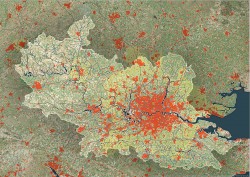The Climate and Environment at Imperial blog has moved. View this post on our new blog
by Peter Blair, Science and Solutions for a Changing Planet DTP student

The Thames Basin is set to face many challenges in the future: climate change, a growing population and economic requirements all present developmental challenges, as well as major sources of uncertainty. Having previously worked on a voluntary project producing a vision for planning in the Great Lakes Basin over the next hundred years, Skidmore Owings and Merrill (SOM) were interested in applying the same methodology to the Thames Basin to determine how we may best plan for the future in this area.
During the summer of 2014, prior to starting the NERC Science and Solutions for a Changing Planet Doctoral Training Partnership at Imperial College, I undertook the exciting opportunity of an internship with Skidmore, Owings and Merrill, looking at the future of planning of development in the Thames Basin.
Who are SOM?
SOM, short for Skidmore, Owings and Merrill, are a world-leading firm of architects, structural engineers and urban planners. They have designed buildings such as the Burj Khalifa and the Broadgate Tower (where their London office is now based), and have worked on the Imperial College Campus master plan, amongst many other projects.
What did I do?
I used SOM’s Great Lakes investigation as an inspiration for looking at planning in the Thames Basin, identifying the assets that the basin has, for example extensive infrastructure, a thriving economy, a history of innovation and a rare depth of culture, the issues that it faces, including overcoming archaic governance boundaries, managing water in the face of both drought and flood, and coping with the change and uncertainty that climate change brings. I produced a booklet identifying first ideas for a vision of what planning in the Thames Basin could be built around in the future. Elements of this vision include integrating the various planning documents that exist into a more cohesive, basin-level plan, recognition of the positive feedback cycles that exist between ‘green’ and ‘blue’ policies and using infrastructure to develop a holistically connected basin.
What did I gain?
I had a fantastic time at SOM: I met a lot of great people with amazing ideas and skills, and was also able to develop myself while there. The internship gave me the freedom and time to develop new skills that are hugely useful, but which I would probably not have had the opportunity to investigate otherwise. One example would be ArcGIS, which allows for the creative display of map-based data, and which I will be able to utilise as part of my PhD, but which I may never otherwise have had to opportunity to learn. I was also able to ‘dip my toe’ into the corporate environment, without having to jump straight in. This showed me the different emphasis which is placed on various aspects of work in business compared to academia: the importance of delivering a positivist message and looking at the big picture, distilling a great amount of information into a short message and using images to convey meaning.
What did SOM gain?
Hopefully SOM feel as though they have gained from my undertaking of this internship as well. As I was a short-term member of the team, SOM were able to work on a different kind of project that was perhaps less corporate and which required different skills. While many other members of the team were working on multiple projects at any one time, I was also able to give my focussed attention to the Thames Basin project. This internship has also strengthened the link between SOM and Imperial College, and building links with academia is something that SOM have been very keen to do.